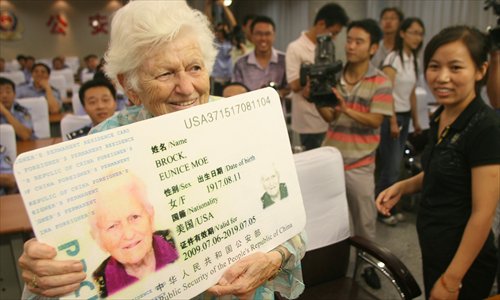HOME >> CHINA
Innovation zone considers ‘green card,’ but immigration reform remains elusive
By Bai Tiantian Source:Global Times Published: 2015-12-8 19:53:01

Eunice Moe Brock, an American who lived in Liaocheng, Shandong Province, gets a Chinese "green card" in 2009. She was the first foreigner in Shandong to get a "green card" for being an "exceptional talent." Brock passed away in 2013. Photo: IC
China's "Silicon Valley" is mulling a pilot program that will lower the threshold for foreign nationals to obtain permanent residency, but an insider said the program still faces political obstacles and it remains unclear when it will be launched.
The news was first reported by China News Service where a director of the Zhongguancun National Innovation Development Zone (Z-park), Guo Hong, told members of the Standing Committee of the 14th Beijing Municipal People's Congress that Z-park will launch a pilot program to help qualified foreign nationals obtain a "Chinese green card."
The program also includes giving overseas ethnic Chinese who hold a non-Chinese passport a special card that grants them permanent residency, which the China News Service report claims will compensate for China's lack of a dual citizenship system.
It was also reported that the program will give foreigners temporary identification papers and allow foreign students to take internships at Z-park.
A media officer from the park, who declined to be named, confirmed the existence of the program with the Global Times but declined to reveal any details.
A source close to the matter, who spoke on condition of anonymity, told the Global Times that the program has been under discussion for at least a year but said the "overseas ethnic Chinese green card" description is inaccurate.
"It's the same permanent residency system whether it is for overseas ethnic Chinese or foreigners. Any speculation that the program would lead to a future dual citizenship system is unrealistic," the source said.
He also noted that the program's proposals have not been finalized. "Many of the measures in the proposals have been verified but when the program will be officially launched remains a question. It could be a few months or a few years," he said.
Unclear path to residency
Permanent residency in China is notoriously difficult to acquire.
From 2008 to 2014, only 1,306 foreigners were given a "Chinese green card" after getting recommendations from ministries or provincial governments, the China News Service reported.
According to the website of the Beijing government, to qualify for a "green card," a candidate has to either be a "high-level foreign expert that promotes China's economic, scientific and technological development or social progress," make an outstanding contribution to the country, make a large direct investment of over $500,000 in China or have direct relatives who are Chinese nationals.
No definition has been given on what kind of work constitutes an "outstanding contribution" or what level of expertise is considered "high" enough for a green card.
"There are institutional obstacles to relaxing the permanent residency policies. Doing so involves cooperative work from public security, civil services, education and health departments. Each department has its own concerns and demands to make," Liu Guofu, a scholar of immigration law at Beijing Institute of Technology, told the Global Times.
Liu said that of all the cities in China, Beijing may be the least likely place for an immigration policy shift to take place.
"Stability has always been a priority for Beijing, which is the political center of China. I don't know how stability and innovation could coordinate with each other," Liu said.
Relaxing the policy may increase the number of foreigners living in Beijing and officials have yet to work out how to deal with such a change when it comes to housing, healthcare and other demands, Liu said.
"Another question is whether Beijing is ready to embrace the pluralistic culture brought by the change… In any sense, politics is the biggest obstacle [for immigration reform in Beijing]. Cities like Shanghai, which is deemed an international financial center, are in a much more favorable position to carry out the reform," Liu said.
According to a report by news portal thepaper.cn in August, Shanghai is already working to relax restrictions on permanent residency.
The Shanghai pilot policy stipulates that expats will be able to apply for a "green card" after working for three years in Shanghai, upon recommendations from his or her employers. The pilot policy will also lift the two-year working experience restrictions for foreigners to work in Shanghai. This means that international students could acquire work visas directly after leaving school.
Newspaper headline: New home sweet home
Posted in: Society